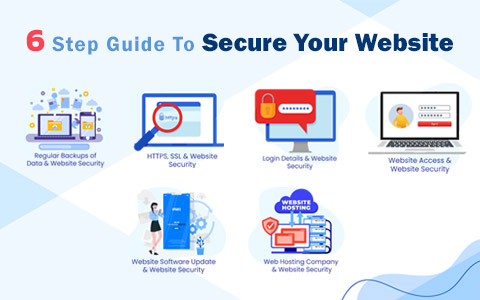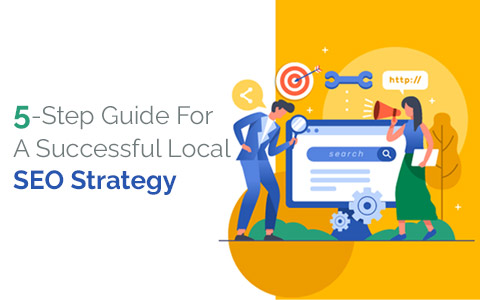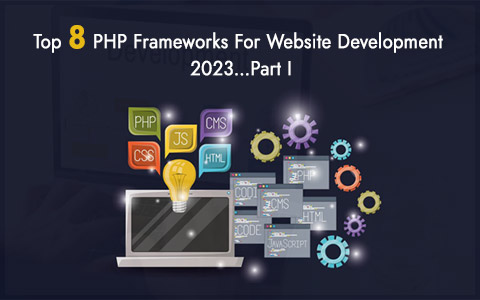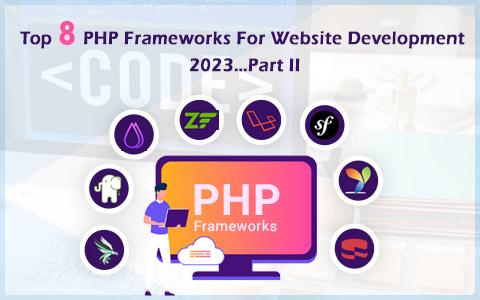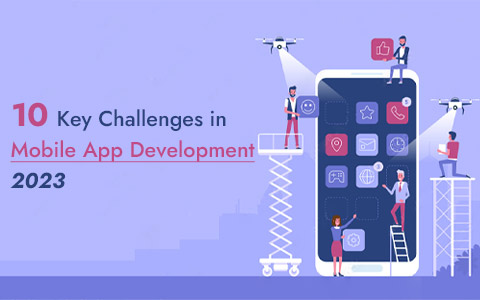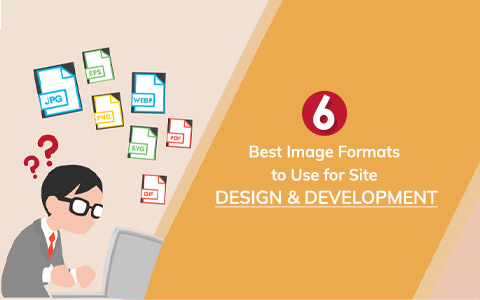Your Technical Guide for Portal Development
 August 8, 2017
August 8, 2017 Web Development Services Website Development Services
Web Development Services Website Development Services
It is a necessity to stay updated in today’s time. If you own a business (regardless of small, medium or large scale), you would want to serve your consumers the best way you can. To make this customer-provider relationship easy and hassle-free the online business portals are gaining lot of attention from today’s modern consumers who are very choosy when it comes to investing their time and money.
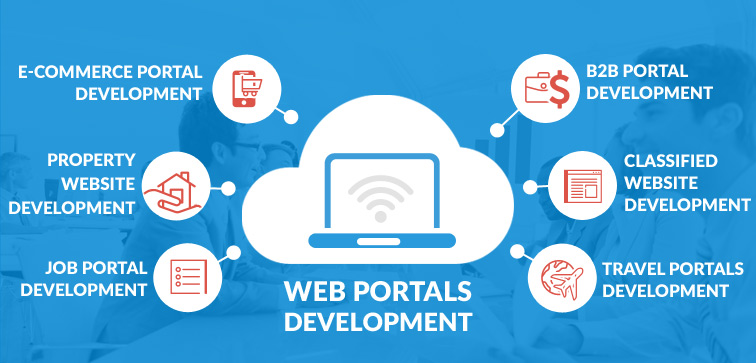
Web portals can help your business grow and improve the revenue besides simplifying the relation with the consumers and buyers. To meet the needs of the target audience, the brands and enterprises are developing customized portals to offer the required products and services at the best price possible.
What is a web portal?
A web portal is a specifically designed website that works as the single medium for delivering multiple sources of information. A web portal is capable of collecting diverse information and making it conveniently accessible to the user. You can say that a web portal is a commercialized structure of a website.
You can develop the customized web portal for your business if you have the required skill set. It is also possible to outsource the services and get the assistance of experienced and skilled professionals in organizing and strategizing the web portal development. Before hiring your professionals for your web portal, you might want to read the easy guideline we have brought for portal development.
We have divided the web portal development into three different phases to simplify the process for understanding the development procedure. Whenever we get the project of portal development related to any line of business, there are basically three phases:
- Pre development phase
- On-going development phase
- Post development phase
Phase 1: The pre development phase comprises of meticulous and thorough planning. All the important information and details that you might need to collect and think over before coming up with a well-designed strategy for the portal development. Some key points to keep in mind while planning for the web portal development are as under:
- Interest: Passion and keen interest is important when deciding on the type of niche market you are going to target. Once you are sure about the area of interest for your business portal, it will become easy to strategize the available resources and knowledge for your web portal development.
- Market: Next step is to study, probe, explore and research the scope of the selected niche market. Find out and learn about your existing market competitors and what strategies can be used to keep provide the needed leverage to the portal. You can learn a lot from the type of mistakes and errors your competitors have committed and come up with suitable plans to avoid such glitches.
- Purpose: What exactly you want to achieve with your web portal is the next question; that means finding the purpose of your business portal. Find out what all can be done to become a reliable service provider for your customers through your web portal. Understanding the needs of your users will help you in developing better products and services that will contribute in forming better connection and bonding with your customers. Offering genuine and reliable services mean increasing your client base on the basis of top notch services.
- Goals: What are the long-term and important goals that you would want to fulfill for your business through this portal? One of the primary goals is to maximize the revenue and total profit. According to the set goals, you will have to come up with revenue models etc. that will boost the brand name, conversion rates and improve the services that being served and provided to the customers and clients.
- Audience: What are the type of customers that will require your products and services? How you can attract your target audience through your portal? What type of product will be in demand? These are some of the questions you should ask yourself before planning your business web portal.
- Content management: Your portal content plays an important role by adding authenticity to your services and products. Make sure to plan out how often you will update your web portal content to keep the customers and visitors interested and well informed.
Phase 2: Once you are through with your initial planning phase, you will come to the second stage of portal development. We have further classified this phase into four different stages of development that is, portal architecture, portal development, portal staging and portal production.
- Portal Architecture is the overall designing and styling of the web portal. Your web designer will play the key role in deciding on the type of designing and styling will suit your business web portal. Your web designer will keep various factors in mind regarding portal design and buyer behavior or consumer psychology.
Your designer will first develop the prototype of web portal before finalizing the site in order to eliminate and prevent errors and mistakes in the actual web portal. Certain factors you must consider while designing web portal are:
- Spacing around web text and image.
- Hassle-free navigation for the visitor or user.
- To build a genuine and trustable connection with your visitor, it is imperative that your web portal consists of ‘About Us’ section or page that provides complete information related to services & products you offer.
- Your customers or visitors might want to connect to you and therefore it is best to include a ‘Contact Us’ page.
- One of the techniques to get potential leads by using appealing and attractive call to action.
- When you add Search tool to your web portal, you make your business portal not just simplified but also time efficient as customer can easily search for the relevant stuff without wasting any time.
- Your web designer can make complete use of the footer section by adding additional but relevant information for the customer.
- It is important to maintain the portal speed and hence make sure that image sizes you are using on the portal don’t impede the portal speed.
- The type of web font is being used for the web portal is also important to consider to make sure the portal looks appealing and simple.
- Development marks the second stage of portal development cycle. It is clear that your web portal will contain multiple pages and all these pages will target certain aspects of your business. In the development stage, navigation model is designed using test data. Test data is also used in content model, page template and display template. Few points that your web developer will consider while developing the web portal are:
- The avg. minimum time for portal load is 0.3 seconds and therefore developer will make sure that the load time doesn’t exceed this limit.
- Navigation is very important aspect of portal user-experience and hence developer will try to keep the navigation simple and smooth.
- Developer will check that web forms are responding well and working as required.
- User Interface has to streamlined and user-friendly to keep the visitor interested while fulfilling the website requirement.
- Supporting the search information with images, videos and catalogues etc.
- Staging is the third step of web portal development. It is further classified into testing and portal deployment. Once designer and developer have completed the initial development of the web portal, the testing phase will check for the errors present in the website. Testing is important to make sure you are providing error-free web portal for the customers and users. Hiring an SEO will be helpful in optimizing your site for better search engine results. The portal testing will include:
- Complete functionality of the portal.
- Checking for the compatibility issues on every platform (including the mobile platform).
- Checking and testing for website optimization on various browsers.
- Checking for Content Management System.
Some of the types of testing that is performed for checking web portals are:
- Stress testing
- Integration testing
- Scalability testing
- Load testing
- Resolution testing
- User acceptance testing
- Cross-browser compatibility testing
- Broader internal reviews
Deploying of the portal is done before the site goes live. The professionals will do test runs and check for the real time issues and fix the errors if they found any. The build has to clear the development tests before deploying. This testing phase exposes the build to the condition that matches the live environment like network configuration, software configuration, server specifications and operating systems.
- Production is the last step of the phase 2 of portal development. It is basically the live environment of the web portal. The administrator of the site performs the tasks such as content management of the portal, updating metadata and managing the web assets with the help of automated scripts. Maintenance of portal life cycle can be performed using:
- Iterative development
- Development framework
- Round trip development
- Enterprise development
Phase 3: Post development phase is the last stage of portal development. After the portal has gone live and is working properly, the administrator has the responsibility to manage the portal as well as repeat the portal development cycle. For managing portal applications and resources, portal development tools come handy; for instance some portal development tools are as given below:
- Library Administrator tool is to assist admin in managing:
- Themes
- Menus
- Pages
- Books
- Shells
- Layouts
- Portlets
- Look and Feel
- Portlet categories
- Portlet producers
- Portal Administrator tool is to assist the portal admin or admins in assembling and combining portals as well as authorized parts of the portals to the end users as well as other administrators.
Connect with Midas
Developing a smart portal means a perfect combination of expertise, skill and experience. Customized portals are easily developed for various business types to appeal to the target visitors and regular users. Travel portals, marriage portals, job portals, classified portals, healthcare portals etc. are example of some of the most commonly developed web portals in today’s time. You contact Midas IT Services if you wish to develop bespoke web portal for your business.
You can contact us for cost-effective and reliable web portal development services. reach out to us at +91 011-26785064 or check our Request Information page.
popular post
-
Must-Have Travel App Features That Can Boost Your Travel Sales

-
8 Issues That Can Cause Website Outage & Their Solutions

-
11 Mistakes To Avoid When Planning For Web Application Development 2021…Part II
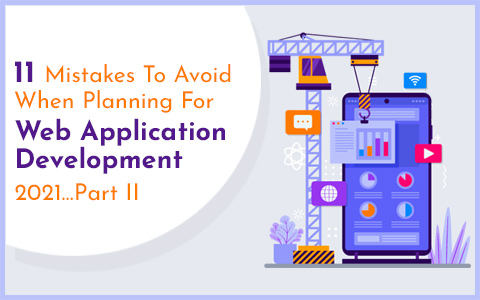
Categories
- Internet Marketing (13)
- Software Development (8)
- Mobile Apps Development (44)
- Web Designing (32)
- Web Development (60)
 business@midaswebtech.com
business@midaswebtech.com